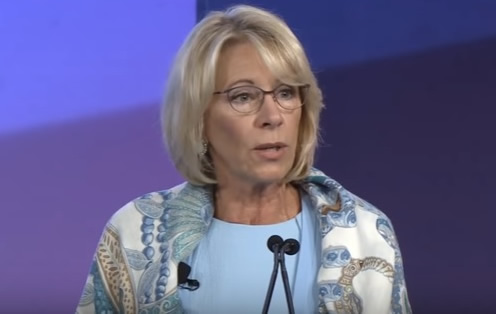During her keynote address at the annual ASU+GSV Summit in Utah, U.S. Secretary of Education Betsy DeVos didn’t stray too far from her usual focus topics.
DeVos covered a range of familiar education topics, and she also touched on the reauthorization of the Higher Education Act, a key federal higher-education law that has languished for years during talks of reauthorization.
Despite ASU+GSV serving as a good platform for DeVos to talk about educational technology and innovation, she instead focused on school choice and reducing the federal role in education.
During a fireside chat with Jeanne Allen, CEO of the Center for Education Reform, which supports charter schools, DeVos glossed over a general question about technology and compared it to “a thousand flower,” adding that we “haven’t planted the whole garden.”
(Next page: 4 things DeVos focused on during her remarks)
Her keynote offered details on a handful of issues that she has focused on since assuming office.
1. Removing the federal government from the equation
“Change we need won’t come from Washington–it will come from the people in this room, and from parents, educators, community leaders and philanthropists,” DeVos said. “My job is to get the federal government out of the way so that you can do your jobs.”
2. School choice akin to cell phone plans?
“In the United States in 2017, no student should be locked into a school that fails them. Even the best-performing school in the country won’t be the right fit for everyone. The simple fact is that if a school is not meeting a child’s unique needs, then that school is failing that child,” DeVos said.
“Think of it like your cell phone. AT&T, Verizon or T-Mobile may all have great networks, but if you can’t get cell phone service in your living room, then your particular provider is failing you, and you should have the option to find a network that does work.
“Let’s be clear. This shouldn’t apply only to K-12 education – we need to innovate, reform, and iterate across the entire education spectrum. Higher education must constantly look for ways to update their models to best serve students as well.”
3. Seat time and new learning delivery models
“Since we have a room full of innovators here today, my question to you is this: if you were to start from scratch, what would America’s education system look like?” DeVos asked.
“Here’s how I would answer the question I just posed to you: We would build a system centered on knowledge, skills and achievement – not centered on delivery methods. Traditional, charter, private, virtual, and other delivery methods not yet developed: all would be treated as viable options so long as they met the needs of their students,” she said.
“This starts by focusing on students, not buildings. If a child is learning, it shouldn’t matter where they learn. When we center the debate around buildings, we remain stuck with the same old system where we can predict educational outcomes based strictly on ZIP code.”
4. Reauthorizing HEA or scrapping the law?
“The discussion is around reauthorization of higher ed,” DeVos said during the fireside chat. “My bigger question is, why would we reauthorize an act that’s 50 or 60 years old and that has continued to be amended? Why wouldn’t we start afresh and talk about what we need in this century and beyond for educating and helping our young people learn? … We should be considering the needs of individuals and students, not a system.”
You can find a full transcript of DeVos’ remarks here.
- 4 ways to support work-based learning - April 23, 2024
- Prioritizing inclusivity in game-based learning - April 22, 2024
- Friday 5: Universal Design for Learning - April 19, 2024

